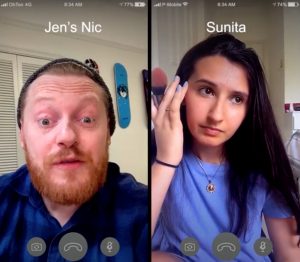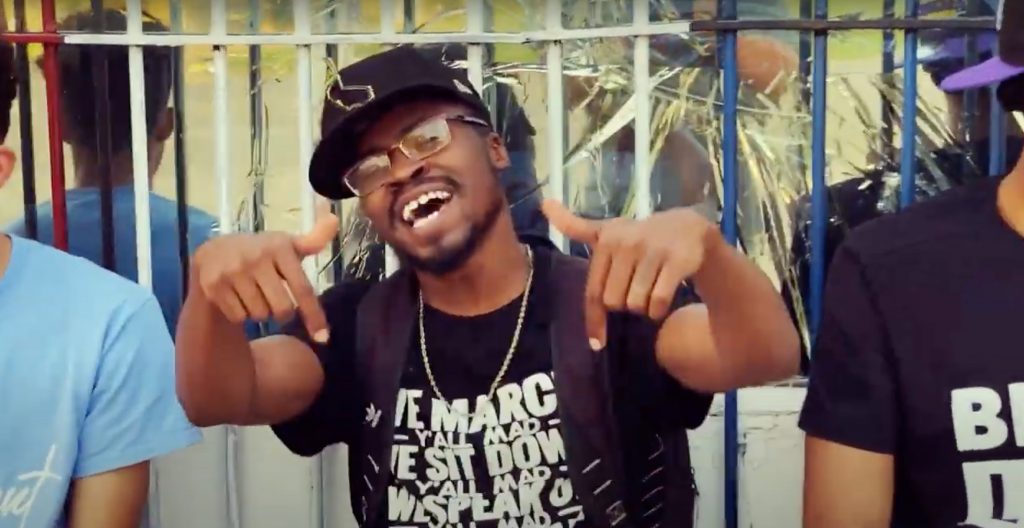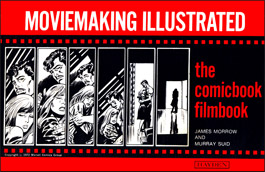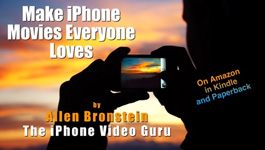During the Covid era, Necessity has given birth to many inventive movies. For obvious reasons these are often dark. But comedic storytellers have long known that humor can be discovered in the worst of times. And so we give you Philip Pugh’s very funny FaceTime movie, “The Maroon Jumper.” The director, based in Birmingham, England, takes us behind the scenes in an interview following the movie.
Interview with Philip Pugh
MobileMovieMaking: What made you want to become a filmmaker?
Pugh: I’ve always been interested in telling stories. I can’t remember a time when I wasn’t writing or creating characters of my own. I also developed an interest in photography when I was quite young and those two interests really collided into wanting to be a filmmaker at some point.
MobileMovieMaking: How did you develop your filmmaking skills?
Pugh: I studied film at University but all the biggest lessons I have learnt have been on set, making films. Books, online tutorials, seminars and lectures all help, but nothing really prepares you for actually making a film. You have to go for it, make mistakes and learn from them.
MobileMovieMaking: Are there any filmmakers who influenced your approach?
Pugh: I’m massively influenced by the American filmmakers who exploded in the early 90s (Tarantino, Linklater, Rodriguez, Kevin Smith to name a few). I love their just-get-on-and-do-it approach. They made blinding films with what they had access to, on minuscule and sometimes non-existent budgets. That problem-solving approach to making an innovative and entertaining film is what inspires and drives me.
MobileMovieMaking: What gave you the idea for “The Maroon Jumper”?
Pugh: The film was completely made in quarantine during the Covid-19 lockdown. I loved the idea of making something with the challenges a worldwide lockdown presented. Again, it goes back to the Kevin Smith/Robert Rodriguez approach of making a film with what’s available to you. I couldn’t get together with anyone to shoot anything and I didn’t like the idea of having actors set up and frame traditional cinematic shots. That’s not their job. I wouldn’t expect a director of photography to act in a scene he just lit and framed any more than I’d expect an actor to light and frame a shot. I’d seen a bunch of projects crop up during lockdown where the actors had filmed themselves supposedly interacting with other actors in the supposed same location, but were actually filmed in entirely different places at different times.
MobileMovieMaking: What’s wrong with that approach?
Pugh: Those projects seemed to be consistently plagued with the same continuity, lighting, framing and (most noticeable) eye-line issues. I thought it was great that people were keeping busy and creative. They were making some really entertaining projects during lockdown. Hats off to them. But I felt it was a shame that those projects were brought down by the technical limitations. They tried to emulate a cinematic style where you’d normally have access to lots of gear and crew, people on continuity and the same lighting conditions on the same set, but they were doing everything with one person, whose skill was above all else acting. I knew I’d be in the same boat, so those limitations had to be part of the make up and aesthetic of the film. I figured if the film took place over FaceTime it would be easy to achieve that look authentically and would solve the issue of not having the actors in the same location as well as eliminating any potential eyeline and continuity problems. That’s not to say we didn’t pay attention to the lighting and framing – we did! We filmed many test shots to see where the best lighting would be, but we only had to make sure the natural lighting and framing looked as good as it could for a FaceTime shot.
MobileMovieMaking: How did you plan the movie?
Pugh: The film was scripted to within an inch of its life! With so many moving pieces and filming everyone separately I couldn’t afford for it not to be. Several other people who I trust took a pass on the script and fed back notes to make it as strong and tight as possible before we even cast the film. I also rehearsed it with people via video chats, with me and them alternating the lines to make sure the flow worked. There was no shot list. The framing was always going to be a head and shoulders selfie vertical shot to emulate a FaceTime call.
MobileMovieMaking: What gear did you use?
Pugh: Well, I actually couldn’t tell you! All the actors filmed themselves on their own phones and sent me the footage directly to review. So, 11 different cameras filmed this little movie and the footage I got back varied in codecs and resolution. I had footage back from 720 up to 4K. I’d imagine that it was a mix of different models of iPhones and Samsungs.
MobileMovieMaking: Could you talk about casting the movie?
Pugh: Whenever I cast I always think about who I’ve worked with before who might be great for one of the roles. I instantly had four great actors who I’d worked with before (Richard Boland, Ryan Wichert, Mathew Waters and Mike Baughan). I was really excited about the opportunity to work with Mat and Ryan again as they had both since moved abroad since I had last worked with them. Mat was in Australia and Ryan was in Germany and the chances of being able to work with them again on a low budget project was slim, so this was a great opportunity to work with them again as it didn’t matter where anyone was based. Not only was it great to work with them again, it was also fun to be working across time zones in different countries. On the flip side, Rich and Mike were literally only 20-30 minutes away, but obviously because of lockdown we wouldn’t be able to get together.
MobileMovieMaking: Did anyone else get involved with the casting?
Pugh: At this point I roped in my friend and producer Nigel Davey as he’s always networking with actors and recommeded Sophia Eleni, Jamie Barnard, Sam Williams and Sally Wood, who were all perfect for their respective roles. Nigel is also friends with the young lad’s (Blake Ellis) Dad, who was a lucky find. At the same time we also ran some online castings to which we had over 750 applications and is where we found Lillie Prowse and Ellie Gill who were great finds.
MobileMovieMaking: We’d like to know about your method of directing the performers at a distance.
Pugh: I arranged to film with the actors I’d previously worked with before first as I knew there would probably be technical and workflow kinks to sort out in exactly how we’d make it work and I didn’t want my first time working with new actors to be fraught with technical issues. Fortunately I’ve worked with Mike Baughan on almost everything I’ve made so we’re very comfortable with each others working methods (quirks!) so he was the perfect person to road test the set up on. It actually panned out pretty much how I planned, but you can never be too careful. I’m still glad we approached it with some caution.
MobileMovieMaking: So how did the shooting actually happen?
Pugh: The set up worked liked this. I filmed with everyone individually. I’d set up a video call with the actors on their laptops or tablets. We’d discuss the shot and lines, and then they’d film a couple of takes and send them to me to review. We’d discuss the shots, lighting, timings etc. and go again as many times as needed. I’d be on the video call the whole time with them, but I wasn’t able to see exactly what they’d recorded until they messaged me the video to review. Some lines required action, which was alway trickier to nail, but it was a pretty effective set up.
MobileMovieMaking: During the shooting, did you encounter any unexpected difficulty?
Pugh: I did anticipate the need for trouble shooting, but there wasn’t any major issues. I just got lucky on this one. I have a million stories from previous shoots where things went horribly wrong and needed some innovative problem solving. This time around I just lucked out.
MobileMovieMaking: Could you talk about your approach to editing?
Pugh: I edited the film on Adobe Premiere Pro. It was a tricky process syncing the best performances together and was one of the disadvantages of making a film this way and having both actors on screen at the same time. I had to use a lot of invisible cuts and speeding and slowing down footage slightly to make sure the reactions to what the other person was saying timed out perfectly, but the endless fiddling with the timing paid off.
MobileMovieMaking: Would you do something different next time?
Pugh: Ordinarily I’d have a long list, but this one just happened to be the perfect storm. I don’t expect that to become the norm.
MobileMovieMaking: What advice would you give to someone who is just starting out making movies?
Pugh: Just do it. Don’t worry about what you don’t have, just focus on what you do have at your disposal and go make mistakes, hone your craft and have fun.
You can find out more about Philip Pugh’s work on YouTube Facebook , and Twitter.
# # #
The editors of MobileMovieMaking have chose “The Maroon Jumper” as the Mobile Movie of the Week.




 Previous post
Previous post
 Next post
Next post






Brilliant film
Great film! Hilarious in it’s one-liners.
Superb 👌🏻
The Maroon Jumper!!!